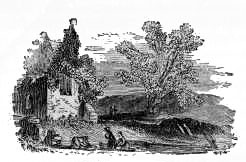Celebrated Irishmen

Goldsmith's Well
Celebrated Irishmen of the Eighteenth Century—Burke—His School and College Life—Early Hatred of Oppression—Johnson's Estimate of Burke—Essay on the Sublime and Beautiful —Commencement of his Political Career—Opinions on the American Question—English Infatuation and Injustice—Irishmen Prominent Actors in the American Revolution—Its Causes and Effects—Burke on Religions Toleration—Catholic Emancipation—His Indian Policy—Moore—His Poetry and Patriotism—Curran—Swift—Lucas—Flood—Grattan—Earl of Charlemont—Irish Artists, Authors, and Actors—Sheridan—Scene in the House of Lords during the Impeachment of Warren Hastings—Goldsmith.
[A.D. 1700—1800.]

ACH century of Irish history would require a volume of its own, if the lives of its eminent men were recorded as they should be; but the eighteenth century may boast of a host of noble Irishmen, whose fame is known even to those who are most indifferent to the history of that country. It was in this century that Burke, coming forth from the Quaker school of Ballitore, his mind strengthened by its calm discipline, his intellect cultivated by its gifted master, preached political wisdom to the Saxons, who were politically wise as far as they followed his teaching, and politically unfortunate when they failed to do so. His public career demands the most careful consideration from every statesman who may have any higher object in view than the mere fact of having a seat in the cabinet; nor should it be of less interest or value to those whose intellectual capacities are such as to enable them to grasp any higher subject than the plot of a sensational novel.
It was in this century also that Moore began to write his world-famed songs, to amaze the learned by his descriptions of a country which he had never seen, and to fling out those poetical hand grenades, those pasquinades and squibs, whose rich humour and keenly-pointed satire had so much influence on the politics of the day. It was in this century that Sheridan, who was the first to introduce Moore to London society, distinguished himself at once as dramatist, orator, and statesman, and left in his life and death a terrible lesson to his nation of the miseries and degradations consequent on indulgence in their besetting sin. In was in this century that Steele, the bosom friend of Addison, and his literary equal, contributed largely to the success and popularity of the Spectator, the Guardian, and the Tatler, though, as usual, English literature takes the credit to itself of what has been accomplished for it by Irish writers.[1]
Notes
[1] Writers.—As a general rule, when Irishmen succeed either in literature, politics, or war, the credit of their performances is usually debited to the English: when they fail, we hear terrible clamours of Irish incapacity. Thackeray commences his "English Humourists of the Eighteenth Century" with Swift, and ends them with Goldsmith! I do not suppose he had any intention of defrauding the Celtic race; he simply followed the usual course. Irishmen are, perhaps, themselves most to blame, for much of this is caused by their suicidal deference to a dominant race.
